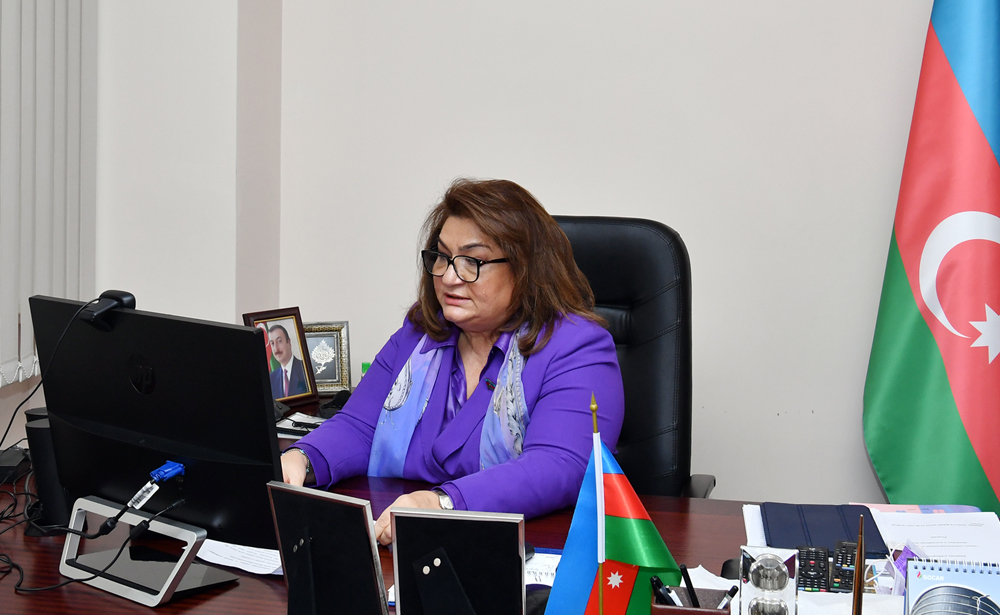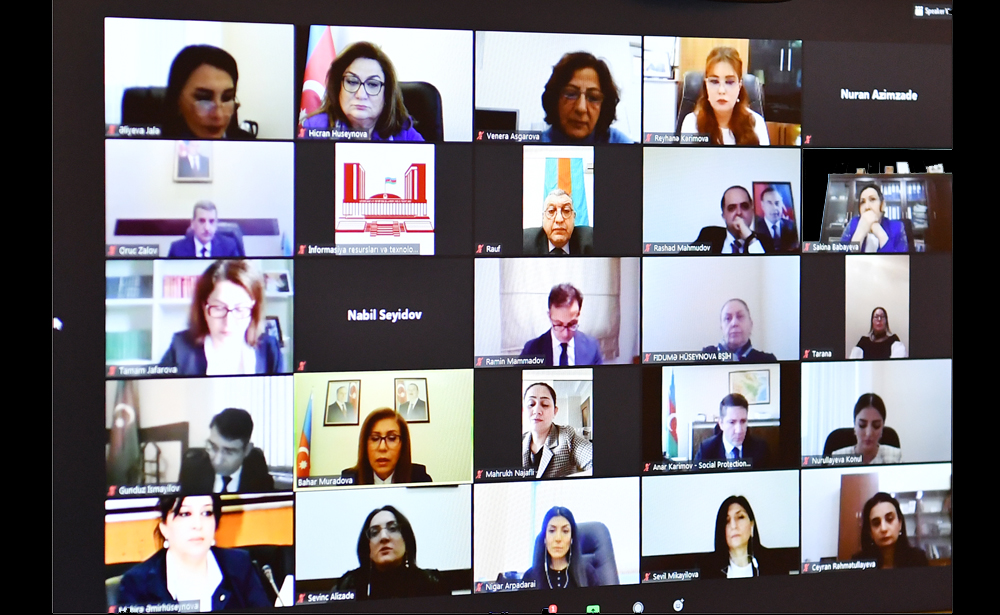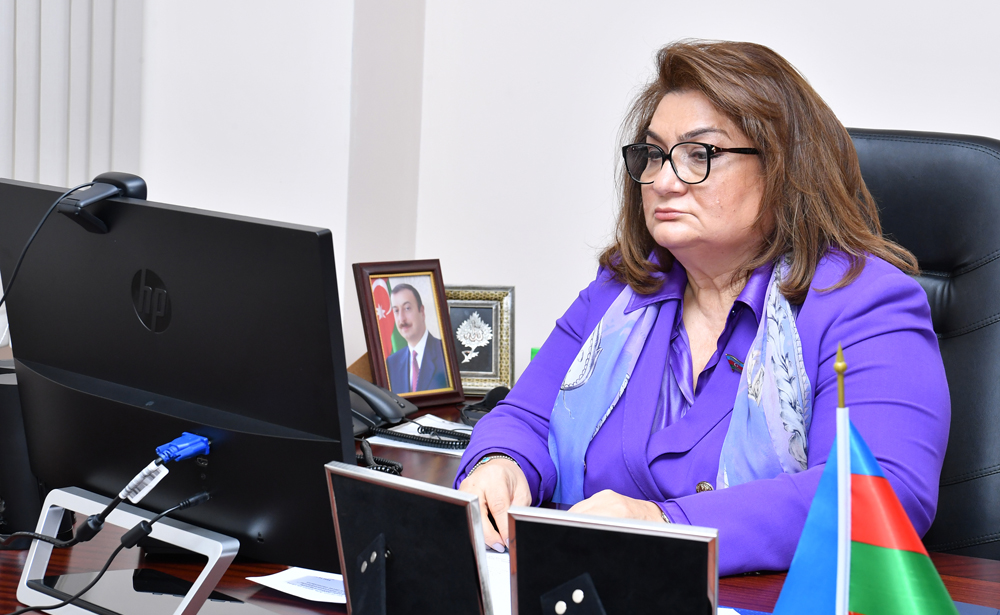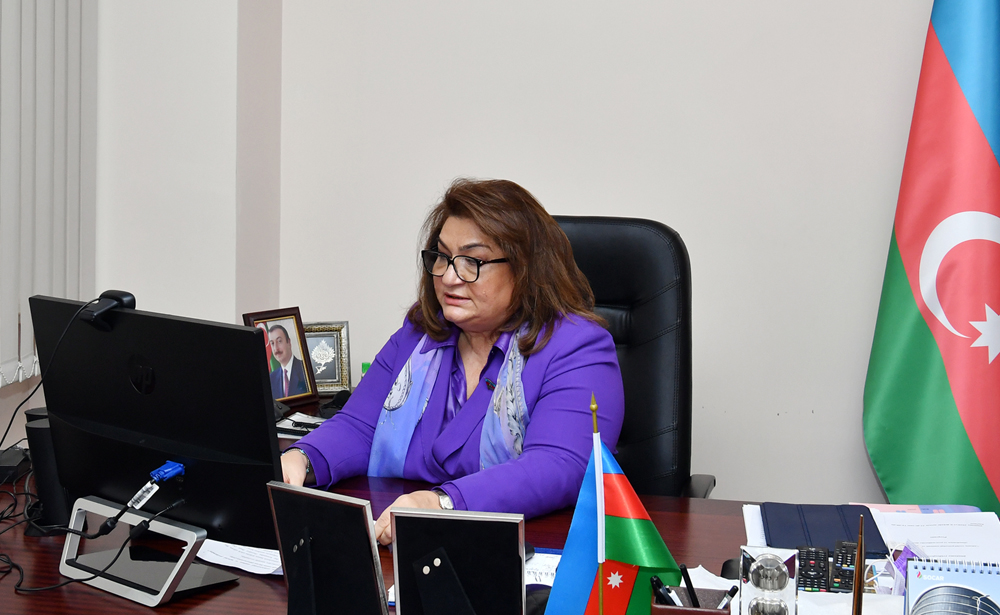A Hearing at the Meeting of the Committee for Family, Women’s and Children’s Affairs

There was a hearing on ‘The Social-Psychological Family Security and the Related Problems’ (during the period of the pandemic and afterwards) at the meeting of the Milli Majlis Committee for Family, Women’s and Children’s Affairs held on 21 December.
Committee Chair Hijran Huseynova welcomed the participants of the meeting and once again cordially congratulated them on the Victory she said had come as the result of the might of our valiant Army and the inviolable national unity brought together by Commander-in-Chief and President Ilham Aliyev had. Mrs Huseynova then asked the Almighty that He rest the souls of the fallen in peace and grant the wounded a soon recovery.
The whole world including our country is struggling against the COVID-19 pandemic currently; at the same time, we specifically are living through a post-war period. Given all this, Mrs Huseynova said, the Committee were going to discuss how the current processes affected internal family relations, what work is being done to eliminate adverse developments and what scope of work lay ahead. She thanked the Administration of the Milli Majlis and Madame Chair Sahiba Gafarova in person for the opportunity to hold such a meeting and for their recommendations regarding it. Besides, she thanked the meeting participants for joining in.
Next, Mrs Huseynova spoke of the Great Leader Heydar Aliyev who had defined the main principles of the Azerbaijani State’s family policy. The preservation and development of the institution of the family is one of the topmost state priorities; President Ilham Aliyev and First Vice President Mehriban Aliyeva take a very focused and caring approach to the question of protecting the national moral values. At the same time, there are certain omissions and alarming manifestations in the families that are now in the centre of both public and state attention.
There are more than two million and a hundred thousand families in Azerbaijan. In our country as much as around the world, there is a lamentable downward trend in the number of marriages coupled with the upward one in the number of divorces. Besides, the COVID-19 pandemic this year had, too, impacted on both figures; many countries are manifesting negative demographic growth tendencies. Nonetheless, Mrs Huseynova went on, we have witnessed how Azerbaijan had become a united force, a big and firm family despite all those hardships. We saw our children sacrifice their lives for their Motherland and we saw the parents who brought those children up. We are also the eye-witnesses of the Azerbaijani President’s love of his nation and of the political will he had manifested.
The social isolation and the quarantine arrangements are crucial in curbing the pandemic. Specialists believe, though, that they could also cause conflicts between family members and, especially, cruel treatment of women; in their opinion, there could also be higher levels of domestic violence worldwide. This adds importance to studying intra-family and inter-personal relations. The timely identification of family problems as they arise and correct decisions made in a crisis in a family’s life can help protect the psychological wellbeing of its members.
Having remarked that the 44-day Patriotic War’s battlefield operations went alongside the enemies’ provocative onslaughts on the civilian population of our country, Mrs Huseynova pointed at the grave psychological blows dealt to those people who had lived through the developments. Children were left without parents, parents lost their children and many families’ houses were destroyed completely. It is crucial to provide those people with social and psychological support to ensure their social reintegration. The war has left a very deep impression in the people; they absolutely need specialist surveillance and assessment of their condition; there are those also who need long-lasting help. The concerned state authorities including the Child and Family Support Centres of the State Committee as well as non-governmental organisations had carried out a certain amount of relevant work; this work must be continued, though.
The Committee Chairman also referred to the necessary measures adopted as instructed by the Head of State Mr Ilham Aliyev and First Vice President Mehriban Aliyeva. She mentioned the emergence of the Anti-Coronavirus Promotion Fund, the Defence Fund and the YASAT Fund, the latter being aimed at providing for those wounded and the families of those killed in defence of the territorial integrity of the Azerbaijan Republic. This notwithstanding, each of us carries a great kind of responsibility in the matter, according to Mrs Huseynova.
She proceeded to underline the importance of assessing the social and psychological condition of the families in the pandemic/post-war period and of taking steps to ensure the relevant problems are solved – including, the steps to improve and adjust the related legislation.
Chair of the State Committee for the Family, Women’s and Children’s Problems Bahar Muradova who was taking part in the online meeting spoke of the very ancient history of the institution of the family in Azerbaijan and of it being a social institution linked to the spiritual values of the nation whilst also staying open to modern tendencies. The family is the social basis of the society; it has a special part to play in the life of a society as well as a state. It is in the family that traditions are taught, and administration and joint householding skills are formed. At the same time, all this has to do with the social and psychological provisions that are connected with both objective and subjective reasons and are also very susceptive to economic situation influences.
Mrs Muradova emphasised the success of the combined efforts of all the state authorities and civil society actors in defeating the enemy and ejecting him from the country, and in solving the problems of the affected families. The endeavours to improve the social and psychological standing of people such as, for instance, the ‘A Gift to the Soldier’ campaign, are commendable. Still, it is important to make certain legislative amendments, in Mrs Muradova’s opinion.
Deputy Minister for Labour and Social Protection Anar Karimov underscored the currency of the matter in hand and spoke of the new initiative of the Ministry: the programmes of psychological aid to the shahid families, wounded servicemen and members of the families inflicted in this way or other during the war. Specialists had been put on those programmes. The new service functions online as well as on locations in view of the pandemic. As many as 1,630 families were visited by psychologists and psychiatrists in a short while; there were various treatment sessions with the people in need of them. In addition, steps had been taken to provide 1,300 shahid families with social benefits starting on 10 November. The new electronic services that were commissioned in December bring on many added advantages. Last but not least, efforts are made to prevent domestic violence; here, the Ministry has an on-going co-operation with the concerned non-governmental organisations.
Deputy Minister of Internal Affairs Oruj Zalov, Deputy Minister of Education Firudin Gurbanov, Deputy Minister of Sport and Youth Intigam Babayev, Deputy Chairman of the State Committee for Religions Organisations Gunduz Ismayilov, head of the Vital Records Registry Service Department of the Ministry of Justice Reyhana Karimova and Head of the Public Health Care and Reforms Centre Department of the Ministry of Health Nabil Seyidov were taking part in the videoconference, too. They brought up such subjects as forming family social and psychological environments correctly, addressing the arising problems including those posed by domestic violence, tracing intra-family relations during the pandemic and the post-war period and other important matters.
Jala Aliyeva and Rashad Mahmudov of the Milli Majlis Committee for Family, Women’s and Children’s Affairs spoke of the hardships in the country caused by the pandemic and the Patriotic War. They emphasised the pressing need to have the state and the citizens united so that those problems could be solved. They also underscored the role of enlightenment in improving the social and psychological condition of families.
There was an extensive exchange of opinions about the matter in hand that went together with the attending representatives of the concerned authorities and civil society actors.
Summarising the meeting, Committee Chair Hijran Huseynova reiterated the importance of the agenda they had gone through; she added that all the offers put forth during the meeting would be considered carefully.
The Press and Public Relations Department
The Milli Majlis






